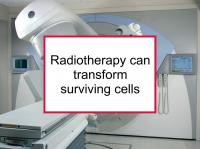Radiotherapy after breast cancer surgery is an important and effective part of breast conserving treatment. However, radiation itself is a risk factor for breast cancer. Girls exposed to extensive radiation of their chests during childhood and adolescence are at heightened risk for breast cancer in adulthood.
Radiation treatment has been suspected of potentiating the breast cancer cells that survive. Now a new study has demonstrated that radiation can reprogram regular breast cancer cells, transforming them into breast cancer stem cells.
Childhood and young adult radiation exposures can increase BC risk
Girls and young women treated for cancer with radiation are at heightened risk for breast cancer in later adulthood. For example, survivors of Hodgkin's lymphoma (who typically receive radiation to the chest as part of their treatment) have approximately five times the risk of breast cancer as the general population. Also, girls who had numerous diagnostic x-rays to evaluate scoliosis and other spine disorders through the mid-1960s (when x-ray radiation doses were higher) have been found to have higher than expected rates of breast cancer. In fact, today's chest CT scans are also introducing increased breast cancer risk, as are mammograms themselves for those with frequent breast cancer screening over an extended period of years.
Cancer tissue microenvironment is altered by radiation
Radiation causes DNA damage, which makes it cytotoxic to rapidly dividing cancer cells. However, radiation results in more than simple cell cycle disruption. One study demonstrated that ionizing radiation acts on the cancer microenvironment. One of the observed effects was accelerated development of more aggressive tumors than those in nonirradiated tissue. In fact, tumors from irradiated animals were mostly estrogen receptor negative (ER-), an effect that the authors linked to mammary stem cell activity. Another study reported that the genomic instability triggered by irradiation was involved in the induction of HER2 overexpressing (HER2+) breast cancer.
Latest research reports radiation can convert surviving cancer cells
The study referenced at the beginning of this news article was designed to investigate the mechanism of action by which surviving breast cancer cells can be made more aggressive as a result of radiation treatment. Breast cancer is thought to be organized into a small number of breast cancer stem cells that are able to re-grow a tumor plus numerous regular breast cancer cells that lack this ability. Regular cancer cells are the progeny of stem cells. Recent studies have reported an increase in the proportion of breast cancer stem cells when tumors are subjected to anticancer treatment. However, the underlying mechanisms leading to this enrichment have not been explained.
In the study, the authors used breast cancer cells derived from breast cancer tissue samples to test the effect of ionizing radiation. The stem cells were removed from the samples and the remaining non-stem breast cancer cells were irradiated and implanted in mice. Radiation treatment kills approximately half of all tumor cells during every treatment. However, the remaining cells become more treatment resistant. Radiation was found to reprogram regular breast cancer cells into “induced” breast cancer stem cells. The authors used a remarkable imaging system that they developed to observe the generation of induced breast cancer stem cells.
The induced breast cancer stem cells were very similar to breast cancer stem cells found in unirradiated tumors, and had a more than a 30-fold increased ability to form tumors. The induced breast cancer stem cells were shown to express the same set of stem cell-related genes as breast cancer stem cells from non-irradiated tissue samples.
Results imply that clean margins and diet during are important
The finding that breast cancer cells that escape the cytotoxic effects of radiation can become more capable of evading treatment and forming new tumors implies that every effort should be made to remove all of the tumor during surgery. In particular, if surgical margins are close or positive, reexcision to obtain negative margins appears to be a better strategy than relying on radiation treatment to mop up any remaining cancer cells.
Second, it is important to avoid consuming any foods or supplements or applying any treatments to the skin that could reduce the effectiveness of radiation treatment. Radioprotective foods and supplements should be avoided unless they have specifically been shown not to interfere with radiation treatment.
Please see our article on breast cancer diet during radiation treatment for more information on how to optimize this treatment.
